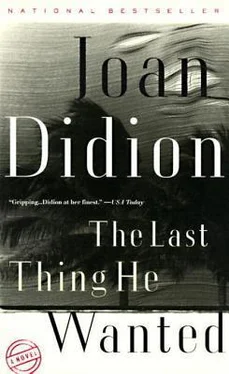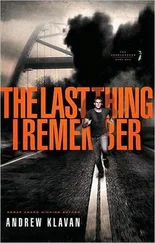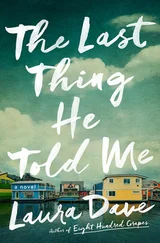“For what,” she said.
“If there were a plot,” the agent said.
“That’s your invention. This whole plot business. Your movie. Not anybody else’s.”
The agent paused. She had agreed to the interview. She had not been uncooperative. Because she had not been uncooperative he let this pass, but what she had said was not entirely accurate. The plot to assassinate Alex Brokaw was not his invention at all. There were various theories around the embassy and also in Miami about whose invention it was, the most popular of which was that Alex Brokaw himself had engineered the report in an effort to derail a certain two-track approach then favored at State, but the existence of a plot, once it was mentioned by what the cable traffic called “a previously reliable source,” had to be accepted at face value. Documentable steps had to be taken. The record at State had to duly show the formation of a crisis management team on the Caribbean desk. The paperwork had to duly show that wall maps had been requisitioned, with colored pins to indicate known players. The concertina perimeter around the embassy overflow office structures had to be duly reinforced. On the record. All AM/EMBASSY dependents and nonessential personnel had to be duly encouraged to take home leave. In triplicate. All American citizens with access to AM/EMBASSY personnel and uncleared backgrounds had to be interviewed.
Duly.
Including this one.
This one had access to AM/EMBASSY personnel by virtue of being on the island.
This one had thrown a glitch.
Something about this one’s use of the phrase “your movie” bothered him but he let that go too.
“If there were a plot,” he repeated, “someone could be using you.”
“Those are your words.”
In the silence that followed the young man had clicked his ballpoint pen on the table. There were other things about this one that bothered him, but it was important to keep what bothered him out of this picture. It was possible they might be experiencing a syntactical problem, a misunderstanding that could be cleared up by restatement. “Why not put it in your own words,” he said finally.
She fished a loose cigarette from her pocket and then, when he made the error of interpreting this as an encouraging sign, replaced the cigarette in her pocket, ignoring the match he was still fumbling to strike.
“There could be a game in there somewhere,” she had said then. “And I could be in there somewhere.”
“In the plot.”
“In the game.”
The agent said nothing.
“In whatever you want to call it,” she said then. “It’s your movie.”
“Let’s approach this from another angle,” he said after a silence. “You came here from San José. Costa Rica. Yet no record exists showing you ever entered Costa Rica. So let’s start there.”
“You want to know how I got into Costa Rica.” Her voice had again suggested cooperation.
“Exactly.”
“You don’t even need a passport to enter Costa Rica. An American citizen can enter Costa Rica on a tourist card. From a travel agency.”
“But you didn’t.”
There had been another silence.
“I’m going to say something,” she said then. “You’re going to get it or you won’t. I haven’t been here long, but I’ve been here long enough to notice a lot of Americans here. I notice them on the street, I notice them at the hotel, I notice them all over. I don’t know if they have their own passports. I don’t know whose passports they have. I don’t know whose passport I have. All I know is, they aren’t on vacation.”
Again she took the loose cigarette from her pocket and again she put it back.
“So I’d suggest you just think for a while about what they’re doing here,” she had said then. “And I bet you could pretty much figure how I got into Costa Rica.”
Subject “Elise Meyer” acknowledges entering country in possession of apparently inauthentic documentation but provides no further information concerning either the source of said documentation or her purpose in entering said country, the agent’s preliminary report read. Recommendation: continued surveillance and investigation until such time as identity of subject can be verified, as well as subject’s purpose in entering said country.
This initial interview took place on July 10 1984.
A second interview, during which subject and interrogator reiterated their respective points, took place on July 11 1984.
Elena McMahon moved from the Intercon to the Surf rider on July 12.
It was August 14 when Treat Morrison flew down from Washington on the American that landed at ten a.m. and, when he stopped by the Intercon to leave his bag, happened to see her sitting by herself in the Intercon coffee shop.
Sitting by herself at the round table set for eight.
Wearing the white dress.
Eating the chocolate parfait and bacon.
When he got to the embassy later that day he learned from Alex Brokaw’s DCM that the woman he had seen in the Intercon coffee shop had arrived on the island on July 2 on an apparently falsified American passport issued in the name Elise Meyer. At his request the DCM had arranged to have him briefed on the progress of the continuing FBI investigation meant to ascertain who Elise Meyer was and what she was doing there. Later it occurred to him that there would have been at that time in that embassy certain people who already knew who Elise Meyer was and what she was doing there, but it did not occur to him then.
I should understand Treat Morrison.
I studied him, I worked him up.
I researched him, I interviewed him, I listened to him, watched him.
I came to recognize his way of speaking, came to know how to read the withheld phrasing, the fast dying fall or diminuendo that would render key words barely audible, the sudden rise and overemphasis on the insignificant part of the sentence (“… and by the way”), the rush or explosion of syllables jammed together (“… and the hell it is …”), the raising of the entirely rhetorical question (“… and … should I have regrets?”), the thoughtful acting out of the entirely rhetorical answer (head tilted up, a gaze into the middle distance, then “I … don’t think … so”), the unconvincingly brisk reiteration: “… and I have no regrets.”
No regrets.
Treat Morrison had no regrets.
Quite early in the course of these dealings with Treat Morrison I came to regard him as fundamentally dishonest. Not dishonest in the sense that he “lied,” or deliberately misrepresented events as he himself construed them (he did not, he never did, he was scrupulous to a fault about reporting exactly what he believed to be true), but dishonest in the more radical sense, dishonest in that he remained incapable of seeing the thing straight. At the outset I viewed this as an idiosyncrasy or a defect of character, in either case singular, peculiar to the individual, a personal eccentricity. I came only later to see that what I viewed as personal was deep in the grain of who he was and where he came from.
Let me give you a paragraph from my notes.
Not interview notes, not raw notes, but early draft notes, notes lacking words and clauses and marked with CH for “check” and TK for “to come,” meaning I didn’t have it then but planned to get it, notes worked up in the attempt to get something on paper that might open a way to a lead:
Treat Austin Morrison was born in San Francisco at a time, 1930, when San Francisco was still remote, isolated, separated physically from the rest of the United States by the ranges of mountains that closed off when the heavy snows came, separated emotionally by the implacable presence of the Pacific, by the???TK and by the???TK and by the fogs that blew in from the Farallons every afternoon at four or five. His father held a minor city sinecure, jury commissioner in the municipal court
Читать дальше












